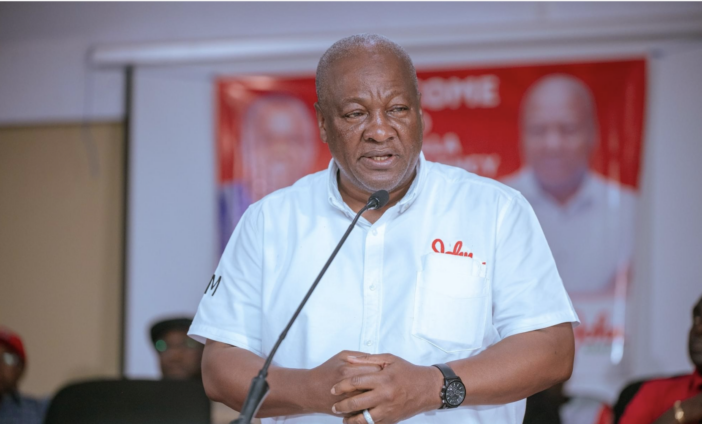Former President John Dramani Mahama has once again highlighted his commitment to transforming Ghana’s economy with an innovative and ambitious 24-Hour Economy Policy.
“This game-changing initiative, outlined under the next National Democratic Congress (NDC) government, seeks to revitalize key sectors and create a robust economic framework capable of driving sustainable growth”.
He said at the heart of the policy was a deliberate strategy to stimulate economic activity by enabling businesses and public institutions to operate around the clock in three eight-hour shifts.
“This 24-hour operational model is designed to increase employment, productivity, production, and revenue, while enhancing access to public services”.
In a recent address, Mahama emphasized the transformative potential of this policy. “The 24-Hour Economy is more than just a policy; it’s a catalyst for industrialization, export promotion, and job creation. It’s about building an economy that works for everyone, every hour of the day,” he said.
The 24-Hour Economy focuses on key sectors such as agro-processing, manufacturing, pharmaceuticals, construction, financial services, and more.
Strategic investments in infrastructure, energy, and security will provide the foundation for businesses to thrive. Public institutions with high customer traffic, such as ports, customs, and the DVLA, will also operate around the clock to enhance efficiency.
He said to ensure seamless implementation, an Accelerated Export Development Authority (AEDA), chaired by the President, would oversee export promotion efforts under this strategy.
“Additionally, a new Employment Act will be enacted in consultation with organized labor and stakeholders to complement existing labor laws and regulate the 24-hour economy effectively.
Mahama’s 24-Hour Economy Policy is underpinned by a comprehensive support package for businesses. Participating enterprises will benefit from tax incentives, financing support through the Ghana Exim Bank, and cheaper electricity rates based on a Time-of-Use tariff system.
The government will also promote the “Made in Ghana Agenda” by prioritizing local goods, thereby stimulating domestic demand and fostering a sense of national pride.
The policy also addresses workers’ welfare by promoting good work ethics and ensuring efficient eight-hour shifts across public and private sectors.
Mahama’s vision prioritizes sustainable, decent-paying jobs that empower individuals and strengthen families.
“The Policy reflects his forward-thinking approach to governance and economic development. By focusing on import substitution, export promotion, and industrialization, he seeks to position Ghana as a competitive player in the global economy.”
Latest Stories
-
Policy Expectations of the New Government: A robust asset and liability declaration framework
15 minutes -
Engender trust to resolve Bawku crisis – Former Defence Minister Dominic Nitiwul advises
51 minutes -
Guardiola divorces wife of 30 years
53 minutes -
Up to 4 in 10 people could develop dementia after 55. What you can do to lower your risk
1 hour -
Mohbad’s widow, father face-off over DNA test
1 hour -
US to remove Cuba from state sponsors of terror list
1 hour -
Jideofor Adibe: Democracy and its Discontents in Africa
1 hour -
Sierra Leone declares emergency over mpox outbreak
2 hours -
South Korean investigators arrest impeached President Yoon, ending weeks-long standoff
2 hours -
Attack on Electrochem sends wrong signals to investors – Ada Traditional Council
2 hours -
Couple in court for allegedly defrauding urban planner of GH¢320K
2 hours -
US markets watchdog sues Musk over Twitter stake disclosure
3 hours -
Bawku needs firm and fair governance to achieve lasting peace – Dominic Nitiwul
4 hours -
Bawku peace eluded us despite our best efforts – Former Defence Minister Nitiwul
5 hours -
Mozambique opens new parliament amid opposition protests and boycotts
5 hours

